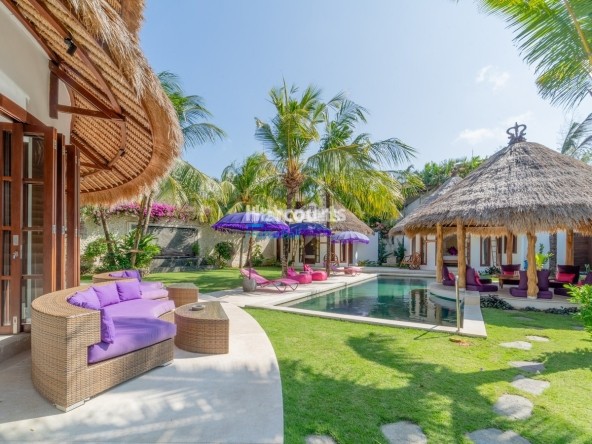by Indonesia Expat – May 11, 2022
After two years of the COVID-19 pandemic and many false starts, Bali tourism has eventually restarted, to the joy of locals and travellers.
Thank you for reading this post, don't forget to subscribe!After two years of the COVID-19 pandemic and many false starts, Bali tourism has eventually restarted, to the joy of locals and travellers.
How does the picture look after two months of reopening? What are the prospects, expectations, and hopes this new beginning brings in?
Visa on arrival (VoA) is back and visitors don’t have to languish in expensive quarantine anymore, nor irritate their nostrils through countless COVID-19 tests before and after arrival, so is everything back to normal? Can we expect everything to return to as it was before the pandemic?
Sure, it hasn’t been a rush since the reopening of the island in March 2022. It looked like everything was covered in dust. Honestly, it was hard to spot any foreign visitors in the streets or at the beach until mid-April. It was, in fact, so seldom that these tourists were really noticeable in the crowd. Putting everything back in motion is not an easy task. Bali’s tourism felt like an old rusted engine that had many hiccups before roaring back to life. But finally, Bali has restarted.
Bali’s economy has taken a big hit and unemployment flared to more than 40 percent. Once again, the Balinese have proven resilient. Many went back to their villages, opened a small business, or worked in the fields with other family members. Some would argue this is now the perfect time to rethink many aspects of Bali’s tourism, admit it or not because it went completely out of limits in the years before the pandemic. Indonesia Expat has interviewed a Balinese figure, a long-time expat, and a Bali-addicted-tourist to hear different perspectives.
Ida Bagus Oka Genijaya, Ubud entrepreneur and occasional philosopher:
“You say the word restart, but for me, it’s mostly the word ‘refresh’ that I would use. Remember that tourism started here during colonial times and changes happened from this point.
“Here, we travel through art and culture; that’s the very basic trait of our people. My grandfather travelled to France and the USA thanks to his art. I have many companies but my original skills are in art and culture – and that’s what we need to bring back. Money is not the solution per se; there is a lot of money in Bali.
“Art is our mother, but it’s also a journey. Balinese art and culture have a lot to do in all aspects. The Balinese have been spoiled with tourism for the last ten years before COVID-19. Whatever we did, we made money! But it stopped in full euphoria! In a way, it united us even more.
“Culture is our birth, no matter who you are – from Java, from Lombok – once you’ve touched ground on this island, you belong. The expats are also referred to as locals. The world has become small nowadays and the island is a big network. In what sense? You would think of business but it’s mostly the social aspect that matters, where ideas can circulate.
“Now, we have to refresh, which means fresh ideas to me. Refresh by looking within. Since the pandemic, I’ve regrouped all my businesses towards my village in Mas, Ubud, the heart of Bali. I stopped following the money as my father said once, now I want the money to follow me. Like in my restaurants, I’ve managed to set up a direct trade network with the villagers where the middlemen have been ousted. Commissions are killing the island businesses.
“Restarting Bali’s tourism is nothing like going back to how it was before. Otherwise, it will show that we never learn from our mistakes. Mass tourism, for example, its pollution will only kill the flow. We shouldn’t be greedy! Tourism shouldn’t be based on greed! We need to make quality, like fine dining if I may say… If we offer good opportunities, good education, quality tourism, and quality people will come to this island; we’ll host amazing people from all over the world! We just have to stay creative. That is what Bali is all about – creativity!
“On the pollution issue, I would stress that progress already came from better education but zero waste is still a long way to go because of plastic. But I have hope; this is a monkey island – monkey sees, monkey do, and next time the monkey is going to do it better.
“Hospitality is in our blood; you ask questions and we never say we don’t know nor we say no! Indonesia needed Bali before but now Bali needs Indonesia and they were here during the pandemic, the local tourists helped us to get through in this difficult time. The anti-virus measures that have been implemented here have allowed us to take care of ourselves again. If we protect others, we take care of the island, of the rivers, of the soil!”
Pascal Maillet, long time expat and recent retiree:
“I first came to Indonesia as a French embassy attaché in the early 90s. I’ve spent most of my time as an exporter of Indonesian products and handicrafts, mostly based in Bali. Things have changed a lot, as you can guess.
“In 2019, just before the pandemic, Bali’s tourism had already reached saturation. Because of a lack of planning, we had entire zones completely locked by road traffic. It became such a problem that plenty of longtime expats moved to remote locations in Bali or even other islands; simply to return to a certain lifestyle, a certain authenticity that was lost in this frantic development all devoted to tourism. This whole frenzy has sorely created an unprecedented disequilibrium.
“Regarding the management of the pandemic itself, I don’t have much to say. Some of my Balinese friends think that the repeated unrealistic announcements of an imminent reopening by the central government have created nothing but confusion and disappointment. It has been positive how efficiently the jab distribution has been organised on the island, and the number of COVID-19 cases never flared up. I’ve also noticed that immigration, contrary to what we could have expected, has given lots of ease to foreigners trapped here in terms of stay permits.
“What amazed me is the resilience of Bali’s tourism sector that survived the pandemic without any revenue, the real estate market linked to tourism activities frozen in time before the slow defrost that we are witnessing now finally happen. Like always, the Balinese have gone through this new hardship spiritually.
“I would say that tourism like before has shown its limits. It’s now urgent to reorganise the island’s economy around more balanced sectors and also activities under consideration of the island’s size and fragility. Opening tourism to seniors would be good if health facilities could improve; I know it’s an old dream of local authorities here and some investments into medical care have been made recently. It’s of prime importance to stop mass tourism. Targeting an ever-increasing number of tourists visiting Bali should be a policy of the past.”
Sarah Montpetit, tourist in Bali and tour guide at home
“Finally, I’m here, with my mother… And we escaped the quarantine! We were waiting for it to be dropped. We only had to show our papers a few times at the airport! We’re here for some time so we applied for a visa from home in Canada and we had millions of documents with us!
“I’m a Bali addict; I was waiting for the restrictions to be lifted to finally return. In Montreal, I’m a tour guide; I organise theme visits to my city, so I understand a thing or two about tourism.
“Here in Bali, I stay exclusively in Ubud. I have the feeling that Ubud went through the pandemic almost undamaged. All my favourite places are still open. I’ve just noticed that international brands have closed down, such as Ralph Lauren and Starbucks. I’m not complaining, they have nothing to do in Ubud in my opinion. Ubud is an international centre for wellness and spirituality, not for shopping. My feeling says tourists stay longer here than anywhere else.
“Maybe local people just expect tourists to come back to make money again, but they should think it over and hope for visitors curious about their culture. Something should be done on the environmental side too. I know that for most tourists, except here in Ubud, this is not a priority, that’s why the Balinese should lead the way on this particular topic. What I still see as a problem is the lack of public transportation, starting from the airport. It’s been fun to be back!”


